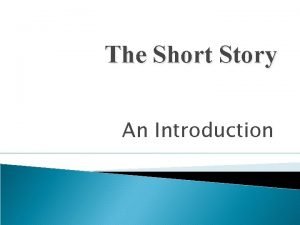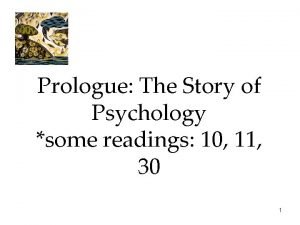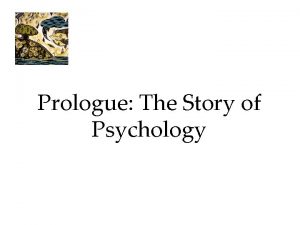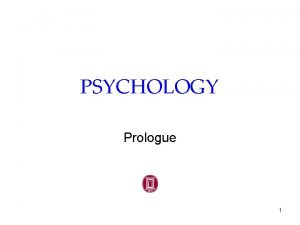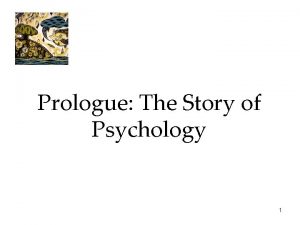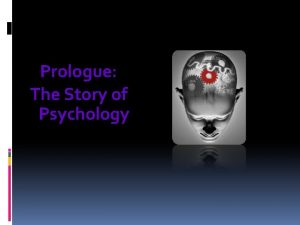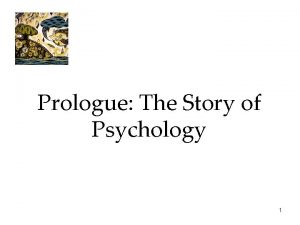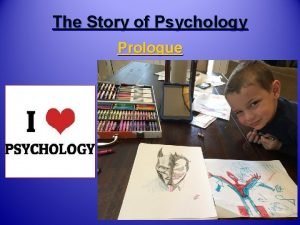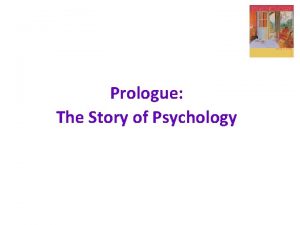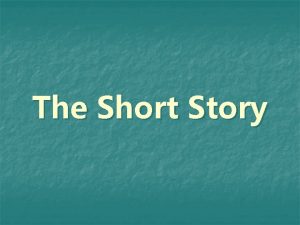Prologue The Story of Psychology A Short History























- Slides: 23

Prologue: The Story of Psychology A Short History, But a Long Past

Definition of Psychology The scientific study of behavior and mental processes

Ancient Greeks § Aristotle derived ideas from observations § Said that knowledge is not preexisting § Developed ideas about personality, memory, motivation, and emotion

Prescientific Psychology § Scientific Revolution § The influence of Newton § The influence of Locke § Empiricism § Knowledge comes from experience via the senses § Science flourishes through observation and experiment

Foundations of Modern Psychology § Wilhelm Wundt opened the first psychology laboratory at the University of Liepzig (c. 1879)


Contemporary Psychology z. Psychology’s Perspectives y. Biological x. Neuroscience x. Evolutionary x. Behavior Genetics y. Behavioral y. Psychodynamic y. Cognitive y. Socio-cultural

Contemporary Psychology § Psychology’s Perspectives § A lot depends on your viewpoint

From “schools” to “perspectives” z Structuralism z Functionalism z Gestalt z Behaviorism z Psychoanalysis z Cognitive z Behavioral z Psychodynamic z Biological z Social-cultural z Humanistic

Cognitive Perspective § Structuralism § Studied immediate experience § Used introspection (looking in) to explore the elemental structure of the human mind § Founded Wundt’s student E. B Titchener

Cognitive Perspective § Functionalism § Focused on the function of mental processes § Founded by William James in 1898 § Heavily influenced by Charles Darwin

zhttp: //www. youtube. com/watch? feature= player_detailpage&v=OSG-t 2 PMvx. Q

Cognitive Perspective z. Gestalt y. Founded by Max Wertheimer and others in 1910 y. Argued that the analysis of the mind could not be broken into its component parts y. The whole is greater than the sum of its parts x. The mind seeks to synthesize information x. The mind is an active agent, not a passive receptacle

Gestalt Psychology

Cognitive Perspective z. Cognitive Perspective y Origins can be traced to Gestalt Psychology y. Study the intervening mental processes between stimulus inputs and response outputs y. Significant contributions made in the areas of language, development, and memory y. Jean Piaget: child development expert

Behavioral Perspective z Early Behaviorism y. Founded by American John Watson in 1913 y. Shifted attention from mental activity to observable behavior y. Behavior can be shaped by manipulating and changing the environment

Watson on Behaviorism “Give me a dozen healthy infants, well-formed, and my own specified world to bring them up in and I’ll guarantee to take anyone at random and train him to become any type of specialist I might select; doctor, lawyer, artist, merchant. And yes, even beggarman and thief, regardless of his talents, tendencies, abilities, and race of his ancestors” - 1925

Behavioral Perspective § Behavioral Psychology § Explain behavior by assessing the effects of external stimuli § Deal with directly observable behavior § B. F. Skinner: most influential behaviorist

Psychodynamic Perspective z Psychoanalysis y. Developed outside the university setting y. Founded by Sigmund Freud in 1895 y. Freud concluded that unconscious mental forces direct our behavior y. Utilized freeassociation and hypnosis

Psychodynamic Perspective z. Psychodynamic perspective y. Human behavior is primarily determined by unconscious processes y. Theory not based on experimental evidence and many aspects are untestable y. Influential to modern psychotherapy y. Carl Jung, Karen Horney, Alfred Adler prominent “Neo-Freudians”

Biological Perspectives z Biological Perspective y. Neuroscience y. Evolutionary y. Behavior genetics z Explain behavior by describing underlying biochemical and neurological causes z Reductionists: observable behavior reduced to physiological explanations z Roger Sperry: won Nobel Prize for split-brain research

Social-Cultural Perspective z. Social-Cultural y. How behavior and thinking vary across situations and culture y. Recognizes the power of the situation in determining human behavior y. Studies the interaction between the environment and actions y. Albert Bandura, Philip Zimbardo

Other Perspectives z. Humanistic approach ? ? ? ? y. Emerged in the 1950’s y. Viewed behavior as a product of free will and opposed determinism of behaviorism and psychoanalysis y. Focused on mental health and positive outcomes y. Carl Rogers and Abraham Maslow y. Currently reemerging as Positive Psychology
 Tall + short h
Tall + short h Story with introduction
Story with introduction Prologue the story of psychology
Prologue the story of psychology Presentation of short story
Presentation of short story Tom brennan quotes and techniques
Tom brennan quotes and techniques Hát kết hợp bộ gõ cơ thể
Hát kết hợp bộ gõ cơ thể Bổ thể
Bổ thể Tỉ lệ cơ thể trẻ em
Tỉ lệ cơ thể trẻ em Voi kéo gỗ như thế nào
Voi kéo gỗ như thế nào Chụp phim tư thế worms-breton
Chụp phim tư thế worms-breton Chúa yêu trần thế
Chúa yêu trần thế Các môn thể thao bắt đầu bằng tiếng đua
Các môn thể thao bắt đầu bằng tiếng đua Thế nào là hệ số cao nhất
Thế nào là hệ số cao nhất Các châu lục và đại dương trên thế giới
Các châu lục và đại dương trên thế giới Cong thức tính động năng
Cong thức tính động năng Trời xanh đây là của chúng ta thể thơ
Trời xanh đây là của chúng ta thể thơ Mật thư tọa độ 5x5
Mật thư tọa độ 5x5 Phép trừ bù
Phép trừ bù Phản ứng thế ankan
Phản ứng thế ankan Các châu lục và đại dương trên thế giới
Các châu lục và đại dương trên thế giới Thể thơ truyền thống
Thể thơ truyền thống Quá trình desamine hóa có thể tạo ra
Quá trình desamine hóa có thể tạo ra Một số thể thơ truyền thống
Một số thể thơ truyền thống

